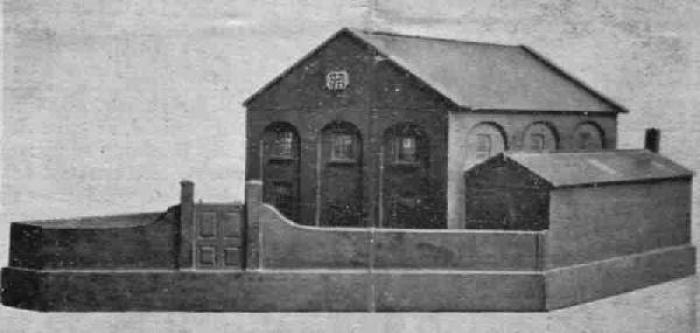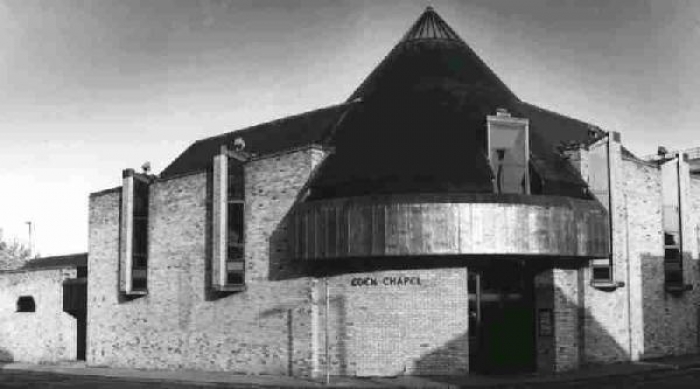This article describes the history of Eden Baptist Church in Cambridge. It was originally published as a booklet on the occasion of the 175th anniversary of the founding of the church. While such dates are in many ways irrelevant they do provide a suitable occasion to look back at where we have come from, examine what God has done and ask ourselves where we are going. The first section provides a brief outline of the background to Eden’s formation and then the events bringing about the establishment of the church are described. The subsequent history of the church is presented both in terms of its general development and its theological changes.
-
Background
-
Beginnings
-
Development
Eden’s First Chapel
Samuel Marks
John Bunyan McCure
Eden’s Second Chapel
David Smith
Eden’s Third Chapel -
Theological Emphasis and Changes
Baptism
Membership
Discipline
Communion
Calvinism
Church Officers -
Conclusions
-
List of Pastors of Eden Baptist Church
-
Acknowledgements
1. BACKGROUND
It can be difficult to know where to begin the history of a single church, as its roots can be traced back and back in time. A useful starting point for Eden however is an illegal non-conformist church in Green Street now replaced by shops numbered 3-5. The church was illegal because of the Act of Uniformity of 1662, which decreed that all religious meetings had to conform to the Anglican prayer book, and all ministers receive ordination at the hands of a bishop. This resulted in some 2000 Anglican ministers leaving the Church of England in what became known as the ‘Great Ejection’. They left because they believed reformation hadn’t gone far enough within the established church, and they joined the increasing numbers of religious dissenters. One such minister was Francis Holcroft, who was later to be dubbed ‘the apostle of Cambridgeshire’. He had held a living at Bassingbourn and a fellowship at Clare College but with the Great Ejection his itinerant preaching ministry began. He and his assistants, Samuel Corbyn and Joseph Oddy, who were both fellows of Trinity College, ministered to a number of small congregations in the area, with Holcroft as ‘moderator’ over these assemblies.
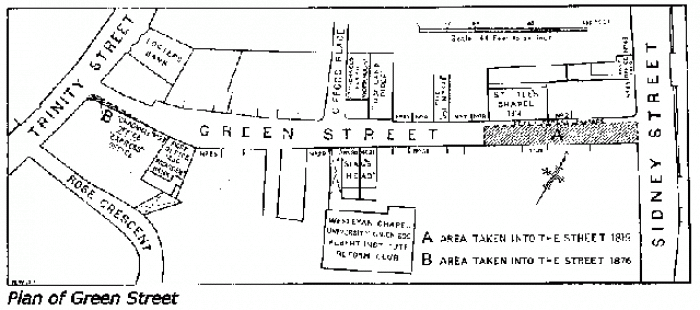
These men suffered for their illegal ministry and Holcroft spent many years imprisoned in Cambridge Castle. Even there his ministry continued, thanks to the well-named gaoler, Mr Prophet, who was so sympathetic to Holcroft’s views that he released him at night to preach to his followers. The illegal congregations where these men ministered usually met in secret, often gathering in a forest at night, in a barn, or a private house. One such congregation, under Corbyn’s ministry, was in the house of a brave widow, Elizabeth Petit, in Green Street, Cambridge. The date it began is not known but it was certainly in existence by 1669. This congregation later built a meeting house in Green Street in 1688, and when the persecution of dissenters came to an end with the Toleration Act of 1689, it became a legally constituted church.
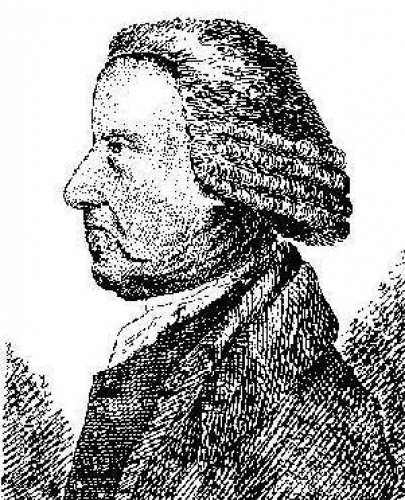
However the vitality that non-conformity had shown under persecution gradually ebbed away in its new-found freedom. Across all of England there was great downturn in religious life and permissiveness became the order of the day. The congregation in Green Street managed to continue its existence apart from brief closures from 1769 to 1772 and 1778 to 1781. New life came in what we now call the ‘Evangelical Revival’ with the preaching of Whitefield and Wesley. The effects of this revival were eventually felt in Green Street as a man called John Stittle (pictured) was converted under the preaching of John Berridge of Everton, who saw a number of local revivals. Stittle became a preacher himself and in 1781 the Green Street Meeting House was reopened with him as pastor. Under Stittle’s rather eccentric ministry the church flourished. He could read, but not write, and university students used to come to ridicule him. Many stories are told of his running battle with the undergraduates. His godliness is demonstrated by one such story, where he invited an undergraduate who had been insulting him to come home and share his supper, after which the student stayed on for family worship. This led the under-graduate to consider religion seriously and eventually to become a preacher himself. Stittle was a high Calvinist and as a result even attracted some of Charles Simeon’s congregation from Holy Trinity in the Market Square when Simeon failed to state Calvinism as conservatively as they desired. When Simeon later heard that Stittle was in financial difficulty he sent him a regular allowance with a note saying ‘for shepherding my stray sheep’. Stittle died in 1813 and was buried in the Green Street Meeting House, by then known as “Stittle’s Chapel”.
A few years later this congregation moved to a building on the other side of Green Street and a group of Stittle’s followers began renting the original Meeting House in their place. This is the group that was to go on to become Eden Chapel. The link between Stittle and Eden is testified to by the re-interment of Stittle’s remains at Eden’s new chapel some years later, when they were disturbed by the redevelopment of Green Street.
2. BEGINNINGS
Eden Baptist Church itself began with some occasional private gatherings to hear a preacher from nearby Godmanchester. This was a Mr Freeman, who had previously formed a Strict Baptist church in Godmanchester and was responsible for the establishment of a number of new chapels in the region. He probably met with this group with an eye to starting such a chapel in Cambridge; and they invited him presumably due to their disaffection with the present chapels available. As a result, when, in 1818, the Meeting House in Green Street became vacant, this group began renting it with Mr Freeman leading the way. While he was responsible for these initial steps he did not become the pastor and for the next two years the new congregation had visiting preachers each week. Whether this new congregation was formed entirely of people from Stittle’s congregation is not known. However, for those there were, it represented a significant change of practice, as Stittle had shunned all baptism, adult or infant, whereas Mr Freeman was very much a Baptist. It is most likely that it was the desire for a Strict Baptist church that motivated this new beginning.
The need for the congregation to have its own pastor soon became clear and they turned to one of the men who had occasionally filled their pulpit, Mr Foreman of Laxfield. Mr Foreman was clear that any church he led would be Strict Baptist in its theology. He wrote in the following way:
I wish to have the people understand what my principles are - I am decidedly a Baptist admitting no mixed communion at the Lord’s table, consequently there is no likelihood of my ever being the Pastor at Cambridge unless it be established upon the above principles. I do not speak this presuming authority over men’s consciences, but order is requisite in all things and two cannot walk together very comfortably except they be agreed.
The church did agree to Mr Foreman’s conditions and he was appointed in 1821. However, no formal church was established at this point, and it was to be another two years before Eden Baptist Church came into being. This eventually happened on 12th October 1823 when six Christians gathered in the vestry of the Meeting House and covenanted together to form a church. The church book records the sentiments of that day:
Although the Church was first formed with so few members, it was a day we had earnestly desired, which led us to reflect upon the way the Lord had brought us, a time of joy and satisfaction, a day that excited new desires and future expectations, concluding with prayer to the Lord that He would look down, visit, water, and cause to flourish the little tender vine which we hoped his own hand had planted. May the little one become a thousand.
The reasons for such a delay in forming a church and the small number included are recorded and give an indication of the theology of this group, or at least of its leader. Mr Foreman wanted time so that people’s principles might be better ascertained, and wanted a small starting membership so that the responsibility of deciding on future members would not be far removed from his hands. These reasons show wisdom in the establishment of a new church where people don’t know each other well, but they are also clear indicators of Strict Baptist theology that was extremely guarded in issues of church membership and would only accept like-minded people.
3. DEVELOPMENT
The church was soon informed that their use of the Green Street Meeting House was not to continue, as redevelopment plans required it to be pulled down. Mr Foreman’s considerable leadership came to the fore again in the building of a new chapel that was to be Eden’s home for the next 50 years. Land was purchased on the corner of Fitzroy Street and Burleigh Street for the sum of £72 and a new chapel was built for a further £800. The chapel opened on 19th October 1825 - the date engraved on the memorial stone, which is now set in the wall of the entrance lobby of the present chapel. The plot of land had formerly been part of a market garden and orchard called the ‘The Garden of Eden’ and so the name for the new chapel virtually chose itself.
Presumably feeling his work was done in establishing the church, Mr Foreman resigned as pastor two years later and went on to an extremely influential ministry in London. The second pastor, William Allen, was also a high Calvinist and was firmly against theological education (his theological stance was underlined by the presence of the conservative Baptist William Gadsby at his ordination service). In response to his forceful style of preaching the congregation swelled and galleries were built to increase the seating capacity. He never seemed to have a very happy relationship with the congregation though. Even when increasing numbers were coming to hear him, Allen reports that some people said, “It cannot be truth, or we should not have so many come to hear it”!
Opposition to his ministry increased and he was eventually asked to leave. He refused and unfortunately the church had to resort to the law courts to enforce their decision. The exact issues involved are not clear, especially as we only have Mr Allen’s autobiography as a source, which asserts his innocence in the matter. The church did state that it was not because of any misconduct by Mr Allen, but that it was considered best for both parties. Mr Allen went on to found Providence Chapel, in Eden Street (which almost certainly became Zion Baptist Church); he later left the ministry and ran a brewery before again becoming a pastor in London.
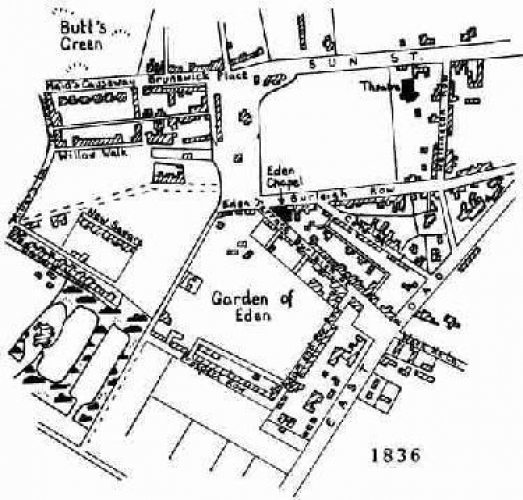
Such difficulties were unfortunately not to leave Eden immediately. The next pastor Thomas Poock was a great contrast to Mr Allen, being well educated and versed in the biblical languages. He had a mixed time at Eden with many enjoying his ministry, but some made charges against his character, which ultimately resulted in the church’s being divided. Poock remained as pastor but a splinter group left the church to form a new congregation called Hope Chapel in Paradise Street. The situation doesn’t seem to have improved with Mr Poock’s replacement, Thomas Field, (about whom we know very little) as he remained in post for only 18 months. When the next pastor, Samuel Marks, arrived in 1851, he said that the reputation of the church was so bad that people were embarrassed to be seen entering the chapel. However, Mr Marks began a new era in the church which, while not increasing the size of the congregation, strengthened it spiritually through a godly ministry. When he left the congregation 18 years later the church book records these words:
He was a man greatly respected by everyone, and carried himself as became his exalted position before the world, that they could have no evil thing to say of him, and by the Church and Congregation was held in high esteem, so much so that they determined to show their appreciation of his worth by presenting him with some tangible proof thereof.
Samuel Marks (pastor from 1851-1869)
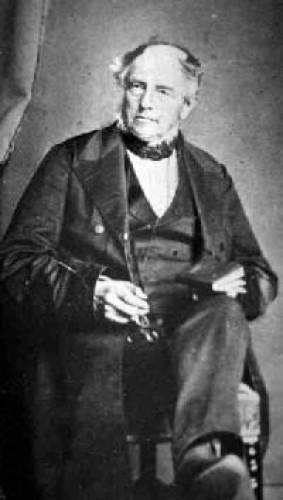 Mr Marks was subsequently presented with a silver teapot, sugar basin and an engraved watch! Having just left Cambridge Mr Marks died the very next day. His body was returned to be buried in the Histon Road cemetery. The church prayed in the following way: “The dear Lord be pleased in his mercy to send us another who shall not only preach the truth, but manifest it in his walk before the world as did he, whose loss we mourn.”
Mr Marks was subsequently presented with a silver teapot, sugar basin and an engraved watch! Having just left Cambridge Mr Marks died the very next day. His body was returned to be buried in the Histon Road cemetery. The church prayed in the following way: “The dear Lord be pleased in his mercy to send us another who shall not only preach the truth, but manifest it in his walk before the world as did he, whose loss we mourn.”
Marks was followed by one of the most famous pastors of Eden’s history, John Bunyan McCure. He had previously travelled extensively in Australia, preaching to the increasing numbers of gold-diggers, and planting churches. After his arrival the congregation grew and it became clear that a new chapel was needed, which was subsequently built on the site of the old building during 1874.
The periodical The Earthen Vessel recorded the laying of the foundation stone of the new building:
Wednesday, June 10, 1874, was a most auspicious day for the Eden Chapel friends in Cambridge. We reached the ground on which John Foreman’s old Eden did stand, and on which John Bunyan McCure’s will soon be raised. The concourse of persons assembled both inside and outside the grounds was beyond our calculation. The crowds spread far and near. The windows of the surrounding houses were filled; and many from London and all parts of the country were to be seen anxious to behold and to listen.
John Bunyan McCure (pastor from 1873-1877)
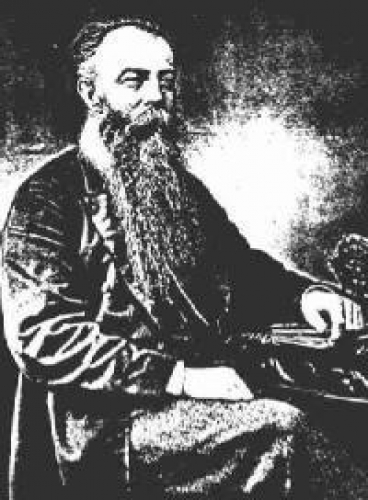 The new chapel, built by Mr Thoday who attended the church, had a seating capacity of about 750. The Cambridge Express praised the “indefatigable perseverance which marks the character of Mr McCure”, and described the new chapel as “one of the most suitable, convenient, and appropriate edifices in Cambridge”. Mr McCure had prayed before the building began that the chapel would be opened free of debt. On the opening day in November 1874 the outstanding amount of an original cost of £1500 was £512. Various cheques were received that day reducing it to £220. During the opening service one of the visiting pastors announced that he “hoped that people would not separate until this small item was cleared off”. He offered one tenth of the amount himself and by the close of the service Mr McCure’s prayer was answered and he had the satisfaction of announcing “It is enough, the building is free from debt.”
The new chapel, built by Mr Thoday who attended the church, had a seating capacity of about 750. The Cambridge Express praised the “indefatigable perseverance which marks the character of Mr McCure”, and described the new chapel as “one of the most suitable, convenient, and appropriate edifices in Cambridge”. Mr McCure had prayed before the building began that the chapel would be opened free of debt. On the opening day in November 1874 the outstanding amount of an original cost of £1500 was £512. Various cheques were received that day reducing it to £220. During the opening service one of the visiting pastors announced that he “hoped that people would not separate until this small item was cleared off”. He offered one tenth of the amount himself and by the close of the service Mr McCure’s prayer was answered and he had the satisfaction of announcing “It is enough, the building is free from debt.”
Eden’s second chapel
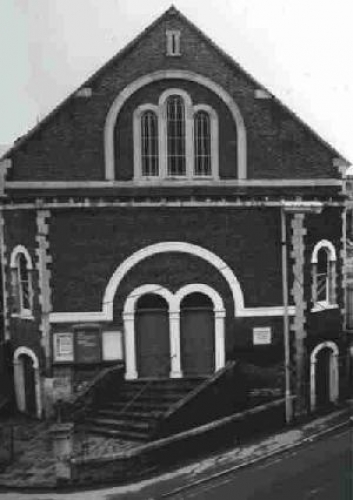 This was clearly a very positive time in Eden’s life; as Mr McCure reports of the first sermon he preached in the new chapel: “I never preached with greater liberty, being favoured very much of the Lord’s presence.” Unfortunately, within two years Mr McCure became increasingly ill and prone to severe bouts of depression. He was given a period of complete rest in the hope that this would return him to good health, but he never resumed his ministry, writing to the church from Scotland to tender his resignation in 1877.
This was clearly a very positive time in Eden’s life; as Mr McCure reports of the first sermon he preached in the new chapel: “I never preached with greater liberty, being favoured very much of the Lord’s presence.” Unfortunately, within two years Mr McCure became increasingly ill and prone to severe bouts of depression. He was given a period of complete rest in the hope that this would return him to good health, but he never resumed his ministry, writing to the church from Scotland to tender his resignation in 1877.
It is worth pausing at this point to mention the theological thinking of that time, and so see where Eden fitted in to it. During the previous century the majority of Strict and Particular Baptist churches had held a very high form of Calvinism which had an extremely deterministic view of God’s sovereignty. This meant that they thought that the message of salvation should not to be offered to non-Christians, as this opposed God’s choosing of the ‘elect’. As a result many churches ceased any evangelistic ministry and in addition became rather cold-hearted places. By Eden’s day this view was still around in some quarters but many had moved on to a view called ‘evangelical Calvinism’, most notably taught by Andrew Fuller from nearby Soham. This was a more moderate form of Calvinism which fully encouraged evangelism, and was more balanced on a number of points. The first of Eden’s pastors were opposed to this new trend - William Allen, for example, clearly opposed Fuller’s writings. However, pastors such as Mr Marks and Mr McCure, embraced Fuller’s views. These men, while remaining Calvinistic in their theology, were extremely warm and gracious in their ministry, and this was perhaps supremely true of the man to be Eden’s next pastor, John Jull.
John Jull took up the pastorate in 1878 and was to be in place for 28 years, only finally leaving due to enfeeblement in old age. Mr Jull’s preaching was greatly appreciated and many testimonies recorded in the church book at this time bear witness to the effectiveness of his ministry. One such testimony, which is by no means unusual, reads as follows:
She stated that it was some 4 or 5 years ago since she was first brought to feel that she was a sinner and during the illness of her dear father she was brought to seek for the Lord to pardon her sins; and this conviction of sin appeared to be very much deepened about 12 months ago when Mr Jull preached from the text, “I will leave in the midst of thee a poor and afflicted people”. And this continued until sometime in September when Mr Jull preached a sermon from the text, “Strengthen ye the weak hands and confirm the feeble knees”, that gave her to feel a sweet hope that Jesus died for her - and from that time she has been gradually led into the liberty of the gospel - and she has been very much exercised about baptism since the last baptizing at Eden, and desires to follow her Lord through that ordinance.
Mr Jull led the way in a number of changes moving Eden away from the Strict Baptist camp; these are described in more detail below. He also instigated a number of superficial, but at the time, telling practical changes which effectively modernised Eden. These included having an organ for the first time, a change in hymn book and changes to the pattern of Sunday services. The organ was considered such an innovation that one deacon suggested that the voting for it should be in the same way as for a pastor, i.e. requiring a 75% majority. This suggestion was actually ignored, and the vote carried by a large majority. Concern for practical care was demonstrated by the initiation of a ‘Coal Fund’ which bought coal wholesale to sell to the poor in the church and community at cost. This seems to have been a time when the church was characterised by a warm and loving community: positive comments are made about the preaching, the quality of fellowship, the atmosphere at regular ‘tea meetings’, and especially at baptismal services. One of these, in 1883, involved Mr Jull’s baptising 12 people in a river near Cottenham, in front of a crowd of some 2000 - which event was described as “a season of refreshing from the presence of the Lord”.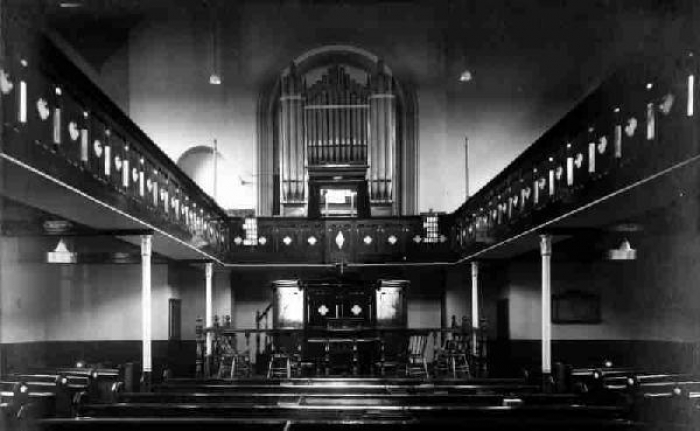
On his completing 25 years of ministry there was a memorable service of thanksgiving involving many pastors from across the country, and a meal served for about 300. It was noted that over these years Mr Jull had welcomed 173 people into church membership, having baptised 123 of them. Mr Jull recorded his sentiments on that day in these words:
Thanks be unto the Lord for his goodness, for his sustaining grace, for keeping me faithful in the ministry of the word and for the steadfastness of the faith in Christ Jesus. Not unto us O Lord, not unto us, but unto thy name give glory, for thy mercy and for thy truth’s sake. May the Lord accept the praises that were offered on that historic day and send further blessings upon the Church at Eden, is the prayer of the pastor. John Jull.
On tendering his resignation due to illness, Mr Jull spoke warmly of the church’s having borne with his failings in a true Christian spirit and of upholding him in prayer; they responded with great thanksgiving for his ministry among them, and with prayer for God’s presence with him, in what were to be his last days.
As can often be the case after a very long pastorate, the church had difficulty in finding a new pastor and two men who were considered decided not to come. One unnamed member wrote a letter to the deacons on the issue which “sounded a trumpet call to every member to endeavour to realise their own personal responsibility in this matter, emphasising the importance of getting alone with God, seeking His guidance and direction rather than advice from our fellow creatures”. Arthur Shinn, who finally came in 1910, was voted on three times before a majority was in favour. Whatever initial scepticism there may have been over his appointment soon departed, however, as the congregation continued to grow under his ministry, increasing in 1917 to 151 members. During this time Eden saw the first missionary emerge from her membership: Lincoln Watts went to India under the auspices of the Strict Baptist Mission in 1915. Eden also arranged practical support during the First World War in the form of the ‘Soldiers Welfare Room’ which was to provide recreational facilities for soldiers in Cambridge.
Arthur Shinn died in 1923, and two years later Albert Whayman became pastor. One quotation from the church records during this time reminds us that great thanks is due to faithful members of the congregation who served the church sacrificially. The church secretary Ebenezer Haynes is remembered in these words:
For the past 17 years he faithfully and splendidly filled his position. Our Pastor found him a perfect secretary. To his fellow deacons he set a great example. The Church and Congregation held him in the highest esteem. He carried all his duties with sympathy, tact, courage, cheerfulness and wisdom. He was beloved and trusted by all who knew him. His faith was simple and strong. His actions were preceded by spirit-taught prayers. He will be much missed, but also remembered with appreciation and thankfulness to God … let his name be an inspiration to us. Ebenezer - hitherto hath the Lord helped us.
During Mr Whayman’s pastorate (which continued until 1943) Eden fell victim to the general decline in church attendance seen across the nation. By the 1940s the regular congregation was only 35-40 strong, which further dwindled to 25-30 in the post-war years. At this point the church was in the anomalous situation of having a church membership list that was larger than its actual congregation.
William Reeves arrived at Eden in 1946, shortly after the Second World War. Mr Reeve’s daughter recalls her father’s faithful service of the church family in these difficult post-war times, and his wider service to the Christian community of Cambridge, including serving as chaplain at Addenbrooke’s and Fulbourn hospitals.
David Smith (pastor from 1965-1976)
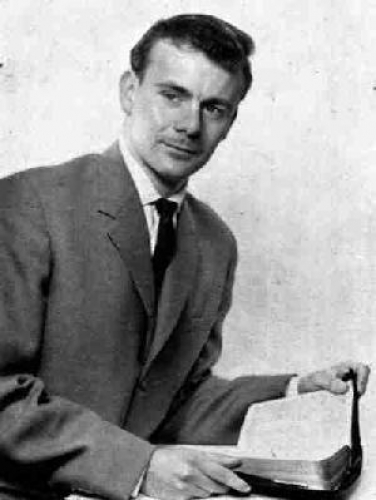 With the departure of Mr Reeves in 1962 one of the deacons commented that the next pastor might be Eden’s last. However, David Smith, although only a young man, fresh out of Bible College, brought a turn around in Eden’s fortunes. He led the church through some extremely important constitutional changes (described further below) and brought a telling change in preaching style. Up to this point the preaching had been doctrinal exhortations, usually loosely based on one verse of Scripture. As a result sermons usually involved restatements of good, but well known, theological points. David Smith brought expository preaching where sections of Scripture were consecutively worked through. This gave a vitality and freshness that was sorely needed, and allowed the Word to challenge and teach in new ways. The congregation began to grow and for the first time university students attended in greater numbers. Mr Smith also brought a missionary vision to the church, which eventually resulted in his own calling to the mission field in 1976.
With the departure of Mr Reeves in 1962 one of the deacons commented that the next pastor might be Eden’s last. However, David Smith, although only a young man, fresh out of Bible College, brought a turn around in Eden’s fortunes. He led the church through some extremely important constitutional changes (described further below) and brought a telling change in preaching style. Up to this point the preaching had been doctrinal exhortations, usually loosely based on one verse of Scripture. As a result sermons usually involved restatements of good, but well known, theological points. David Smith brought expository preaching where sections of Scripture were consecutively worked through. This gave a vitality and freshness that was sorely needed, and allowed the Word to challenge and teach in new ways. The congregation began to grow and for the first time university students attended in greater numbers. Mr Smith also brought a missionary vision to the church, which eventually resulted in his own calling to the mission field in 1976.
The modernisation of Eden continued with the next pastor, Dr Roy Clements. He brought a vision of ‘progressive evangelicalism’ - where the Bible remains the touchstone for faith and practice, but tradition does not, and the church attempts to be as applied to the contemporary world as possible. This approach, along with his exceptional preaching gifts, was used by God to grow the church substantially. In particular large numbers of students from Cambridge and Anglia Ruskin Universities were drawn to attend Eden regularly.
The chapel of 1874 remained Eden’s home until the redevelopment of the local area in 1982. This resulted in the building of the present chapel (opened in December 1982), while the old chapel was incorporated into a new shopping centre, The Grafton.
The term time congregation in the mid 1980s grew to well over four hundred which stretched the seating capacity of the new building. The resultant overcrowding led to the formation of satellite congregations in the north (“Chesterton”) and south (“Morley”) of the city in 1988. The north congregation was later subsumed within the other two, but overcrowding became an issue again and in 1998 a second morning congregation was formed for a few months to allow space for growth.
At Easter 1999 Roy Clements' long and fruitful ministry at Eden came to an end. In September that year, very sadly, he left Christian ministry and his wife and family. This was a time of crisis for the church. Substantial help was given to the church by The Revd Robert Amess who acted as Interim Moderator. During this time the question of independence for the South Cambridge congregation was raised. Entirely amicable discussions, facilitated by Robert Amess, led to this congregation becoming independent as Rock Baptist Church in 2000.
Robert Amess also led the church through a process of vision casting (which produced the current vision statement); of seeking God in repentance; and of pastoral search. This last culminated in the call of Julian Hardyman, who had been Associate Pastor since 1996, as Senior Pastor in 2002. The rebuilding of the church after the difficulties surrounding Roy Clements' departure was able to begin. There was real healing from the Lord through the Gospel and the Holy Spirit and a sense of a new, different phase in the church’s life.
Since 2002 there has been something of a shift in the balance of the congregation. While the student ministry remains vibrant and extensive, there are more families and children than ever before. This has led to the appointment of a Children’s Worker and a Youth Worker, and a sense of significant ‘next-generation’ investment from 0-25. The church also benefitted greatly from the long term service of an Administrator and a Pastoral Worker. At the same time, the launch of Friends of Eden and the generosity of a charitable trust has enabled the church to employ full-time student workers who have developed the student ministry still further. In addition over the period 2002-2017 a number of Eden folk have been sent out into Christian ministry at home and abroad.
By 2008 the building was becoming uncomfortably full again on Sunday mornings. This led to extended discussions about church planting and to the call of Graham Beynon, (who had been the Associate Pastor, who led the south congregation into independence as Rock Baptist Church in 2000) to be Pastor of the new church, which was planted into North Cambridge as Grace Church in 2012. Over 40 Eden members and a number of children were joined by 20 members from Rock Baptist Church.
In 2011 Eden became a member church of the Fellowship of Independent Evangelical Churches, out of a desire to join more fully a significant national gospel movement. Locally Eden enjoys close relationships with the other FIEC churches (Rock, Grace and three further plants: Hope Church Teversham, Christ Church Trumpington and Emmanuel Northstowe) as well as with a number of other gospel-centred churches.
4. THEOLOGICAL EMPHASIS AND CHANGES
The group that formed Eden were ‘Strict and Particular’ Baptists. As was mentioned earlier it was probably this theological emphasis that was the driving force behind the formation of the church. However, over the church’s history a number of changes can be seen in theological position.
Baptism
As would be expected believer’s baptism has remained a hallmark of the church. The church has stood by the understanding that the visible church of Christ should be marked out by the symbol of baptism. The only change has been in the latest statement of faith (1972) becoming less rigid, in no longer saying that baptism is only correctly performed by immersion.
In the early 2000s the Pastors and Elders became increasingly aware of the pastoral needs of a small number of committed attendees at Eden who had been christened as infants and who felt strongly that this fulfilled the command of Christ to be baptised such that they could not in good conscience be baptised as adult believers. After much discussion and prayer it was decided by the Elders, in 2021, to propose to Members that membership become available to regular, committed attendees such as these who, to the Elders‘ satisfaction, earnestly held to this view. A detailed proposal was discussed at members’ meetings in late 2021 and early 2022 and then formally approved by vote of the church membership at the Annual General Meeting on 24 May 2022.
Membership
Testimony of conversion and subsequent baptism were, and still are, held to be necessary for membership (except in those cases where an applicant’s convictions fall within the exception approved at the May 2022 vote, explained above, where testimony of conversion will still be required). The emphasis on a personal experience of conversion is demonstrated by the writing out of each applicant’s testimony in the church book for over 100 years. The emphasis the church gave to membership is shown by an extremely cumbersome application procedure involving at least two church meetings, an interview with the pastor, a further interview with two appointed visitors, giving testimony before the church and a vote by the church. This careful guarding of membership is due to the simple concern that all members should be truly converted, as members then had the right to take communion and to affect church policy by their votes.
In 1980 the requirement for making public testimony for membership was removed, as it was felt this prevented some people from becoming members; instead the visitors could relate the applicant’s testimony to the church. Practice has subsequently changed further in that the elders have been given the responsibility for interviewing and deciding on membership, rather than requiring a vote by the membership.
A congregational view of membership was and is still upheld. This was seen most clearly in the method of voting for virtually any decision in the church’s life, e.g. changing the order of the service. This resulted in extremely frequent church meetings often for only one item of business. As the church has grown much more responsibility for decisions has been given to the pastor and the elders/deacons without requiring the vote of the membership.
Discipline
The old rules of the church for discipline of members may seem very harsh to us. You could be disciplined not only for misconduct, but also for not agreeing entirely with the church doctrinal statement or for not attending communion on three consecutive occasions. While the same zeal for the purity of the church has been maintained the conditions have been simplified to any “serious offence”. This effectively opens the way for a broader range of personal views of doctrine within the church and does away with the arbitrary stipulation on attendance.
Communion
Originally only members of the church and members of other Strict Baptist congregations were allowed to take communion, and a member could not take communion elsewhere unless that church was also of Strict Baptist practice. These rules were enforced to the extent that church discipline would be taken against a member who shared in communion with an ‘open communion’ church elsewhere.
By 1904, under Mr Jull, the rules were changed to allow members to take communion at other churches which were not themselves Strict Baptist, and to allow baptised believers from such churches who were visiting to take communion at Eden. These proposals caused some debate but were voted through by a large majority. Further change took place in 1972 under Mr Smith, whereby visitors who had not been baptised as believers, but who were in fellowship with an evangelical church, were invited to participate in communion. This effectively represented a clean break with traditional Strict Baptist practice.
Calvinism
As has been mentioned already some of the early pastors of Eden were high Calvinists. However by 1882 when Mr Jull led the church in forming the first ‘articles of faith’ it was a more moderate Calvinism that they expressed. By the time of the revision of the articles of faith in 1972, while essential features of Calvinistic doctrine are maintained, they are expressed in a more balanced form of words.
Church Officers
The church was established with the office of pastor, who was a “spiritual labourer in word and doctrine”, and deacons, who were responsible for the “temporal affairs of the church”. This resulted in the somewhat monarchical rule of the church by the pastor, and the inevitable involvement of the deacons in spiritual as well as practical matters, particularly when a pastor was not present. A major change came in 1972 with the adoption of an eldership (including at least one teaching elder, or pastor), and a separate diaconate. This resulted in a greater team leadership of the church, which is a policy that has been continued, especially with the appointment of associate pastors.
5. CONCLUSIONS
History is there for our interest but also for our education and it is worth concluding with some suggested lessons from Eden’s history:
- We stand on the shoulders of those who have gone before us and so we should be grateful to God for all he has done through the people mentioned in this history. In that regard we should note that although Eden’s beginnings were set in the exclusiveness of the Strict & Particular Baptist movement, she also stands in the broader heritage of the evangelical revival of the eighteenth century and evangelicalism within Cambridge, and has moved to a more balanced evangelical position. We are grateful both for that heritage and for those who have steered her course since then.
- Eden has been seen to suffer from disunity in the past, and the terrible damage that ungodly, divisive behaviour can bring should be a warning to us; no church is immune from such problems.
- The willingness of pastors to teach the word without compromise, and the willingness of the congregation to apply it, has, in God’s grace, saved Eden from the obscurity which has been the lot of some who have stuck to tradition and resisted change. We should continue in this vein, holding fast to the unchanging gospel but always relating it to a changing world.
- God has preserved the church in sound doctrine - the Scriptures have been faithfully taught and people have testified to the power of the gospel in their lives. We should be grateful for this, especially when we view the drift into liberalism that has affected many over this past century.
- A warm and caring fellowship that longs to see God’s love lived out among his people has characterised Eden’s best days. This should encourage us to play our part in living with each other in true Christian community.
- The testimony of history is that the godly living of individuals trying to serve God and bring him glory is what leaves its mark. This is especially true of those who lead the church because of their position of influence, but is a challenge to us all: with God’s help, what history are we currently writing?
As we give thanks to God for all he has done and consider our part in continuing the building of God’s kingdom in Cambridge we would do well to listen to the encouragement and prayer of Mr Jull when he tendered his resignation as pastor:
I entreat you: To be of one mind in the Lord, and to seek each others welfare; aim at the good of Zion and the glory of God. Be kind and courteous to each other; contend earnestly for the faith once delivered to the saints. Abide in Christ and the great doctrines of grace that emanate from His sufferings and death for you - Now may the Triune God of Israel bless and keep you in the bonds of Peace, Love and Unity. May the grace of the Lord Jesus Christ and the love of God and the communion of the Holy Spirit be with you all, Amen.
6. LIST OF PASTORS OF EDEN BAPTIST CHURCH
1823-1827 John Foreman
1828-1832 William Allen
1834-1844 Thomas Poock
1846-1848 Thomas Field
1851-1869 Samuel Marks
1873-1877 John Bunyan McCure
1878-1907 John Jull
1910-1923 Arthur Shinn
1925-1943 Albert Whayman
1946-1962 William Reeves
1965-1976 David Smith
1979-1999 Roy Clements
1996-2023 Julian Hardyman (Associate Pastor 1996-2002, Senior Pastor from 2002)
7. ACKNOWLEDGEMENTS
The author acknowledges with gratitude the help of the following in the preparation of this history:
- Stan Blake for his perceptive comments from his own research and memories;
- John Stear for his encouragement and help with documents;
- Andrew Brown for an extremely helpful bibliography;
- David Smith, who gave a lecture on this subject on the occasion of the 150th anniversary of the church, which has been drawn on at certain points.
- Chris Akhurst for his editorial help.
- Roy Warnes for his expertise and patience in printing.
- Heather Reeves for providing further information on her father’s time as Pastor at Eden.
Original text by Graham Beynon, 1998
Updated by Graham Beynon and Julian Hardyman, October 2018
Updated by Graham Beynon, Julian Hardyman and Steve Wright, June 2022
Updated by Graham Beynon and Steve Wright, October 2023

